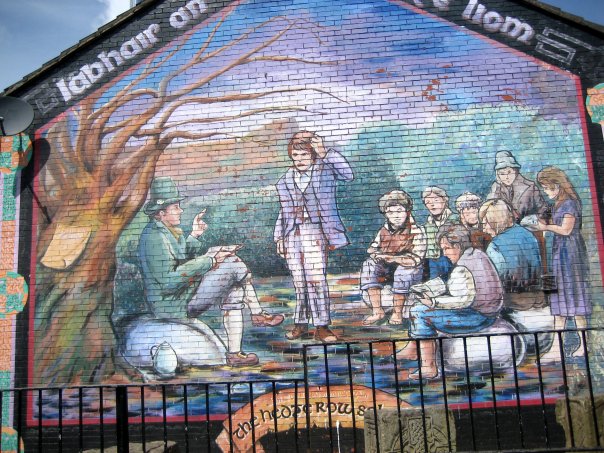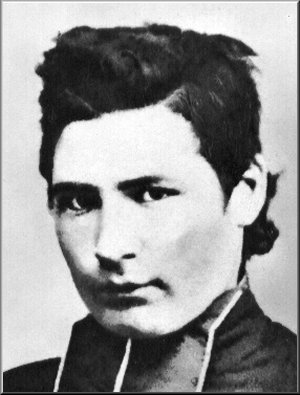
Back to the Hedge School: the future of Catholic schools in Ireland?
Getting time to blog has been difficult in the last week - various pastoral duties; yesterday was pretty busy. So time, I think, for a little news round up so Father Director can get on his pony and rant for a bit - we all need a bit of a rant every now and again. Famous last words which will be regretted, no doubt, as I sit in the rogue's gallery waiting for my turn in confession. So "Charitas" as St Francis de Paolo would say.
My colleague over at the St Genesius blog has an interesting post on the ongoing discussions over the future of Catholic education in Ireland. Our American and British readers will know all about this since they have been dealing with the assault on Catholic education for decades. It seems that the draft proposals for Catholic schools (ie those the government decides to leave with us) are suggesting that religious education, and indeed ethos, be strictly kept to certain times and not permitted to "infiltrate" (my word) the rest of the curriculum.
Well, the Catholic Church's response to this should be brief and unambiguous: "Not on your Nellie!" Here's where the new appointments to Irish Sees becomes important. The new Irish bishops will need to be strong and indeed defiant in the face of such suggestions. If these proposals are to implemented by the government, then the Church should refuse to accept them and refuse to implement them in our schools.
Lest the fearful among us object - the Constitution of this country is on our side on this one, and we should use it. I often ask myself, why is the Church in Ireland terrified to use the Constitutional protections we have and actually feel the need to negotiate a compromise when there is no need to do so? There seems to be a fear of standing up to the government.
We do not have to hand over schools. Regardless of what Irish ecclesiastical figure says we should, there is no onus on us at all. It is up to parents to decide if they want a Catholic education for their children. If the majority do, then there is a need for lots of Catholic schools. If secularists want non-denominational schools, they are entitled to them under the Constitution - so they go and set them up and the government must support them. But why are they whining on about Catholic schools? Is it the case that they do not want to go to the bother of setting up their own, they want to take the easy way out and take over ours? Or is it a case they want to get rid of Catholic education altogether?
Ironically, as has happened in other countries, when all this has been settled, and there are secular schools galore, there will be a clamour to get children into the remaining Catholic schools, and no doubt you'll find plenty of secularists among them.
As for the suggestion that the display of religious artifacts "be inclusive of all belief systems". With all due respect, if you pop into a Jewish or Muslim school you will not find a crucifix (which is offensive to Muslims by the way - they do not believe Jesus was crucified), nor a statue of Our Lady of Lourdes. Nor, in a Catholic school, should we find statues of Hindu gods, Buddha or a mihrab. Nor should we celebrate the festivals of other faiths since many of these are offensive to our Christian faith. How can we, as followers of Christ and as monotheists have our children, whom we are trying to catechize, celebrate Rama Navami, the feast of the birth of the god Rama? Yes, we must teach our children respect for other religions, and something about them, but as for putting them on the same level as Christianity by celebrating the feasts and erecting shrines to other gods, that's not on. Again, the response to this must also be decisive "No".
In other news, RTE is reeling (no pun intended) from the government's decision to hold an enquiry into the defamation of Fr Kevin Reynolds. As we all know this case was horrific, and to be honest I am delighted things have turned out as they have: we need to expose the shoddy journalism which has become commonplace in a number of media organisations. Here is one priest who did not sit down and take the accusations, and while I have little time for the ACP's ideological agenda, I think they have done the Church in Ireland a service by pushing Fr Reynold's case. I know of too many cases where innocent priests and religious were not permitted to challenge accusations. It was easier to pay the compensation and apologise, and so some superiors took that road rather than risk offending people in the current climate.
The question is: how will this inquiry turn out? Will RTE learn? And will other stories which were not entirely true be investigated also? Is this a single enquiry into one case, or will the government bite the bullet and conduct a thorough investigation?
The full implementation of the corrected translation of the Missal is upon us. On Saturday evening, with the Vigil Masses, all texts for the Mass must come from the new Missal - the old Missals are no longer to be used. As you trot across the net you'll find many articles and blog posts on this, and many are not happy. One writer says the implementation of the new Missal is an act of Vatican Vandalism (some say the implementation of the vernacular Missal was another such act - I shall not comment). What I find most amusing, is that the liberals who are protesting are in the same position as the traditionalists back in the Seventies - they do not want the change, they will resist it; they will cling to the old Missal for dear life. I wonder if that irony has dawned on them.
My own experience has been positive. In my parish my people have responded most generously to the new translation. My daily Mass goers have the new responses off by heart. Some have wondered why the change, and they have listened to the explanations. For a number of weeks I devoted the Sunday homilies to the new translation and to a catechesis on the Mass in general and it was well received. I think when people are introduced to the new translation with openness and enthusiasm, they respond. A friend of mine, a layman, said that in parishes where the priests are positive and explain the changes and reasons for them, the people will be positive and welcome the translation; in parishes where priests are negative and rebellious, the people will be negative. There is some truth in that. In the meantime I must pop out to the cemetery and find a nice spot to bury the old Missals - I don't like the idea of burning them.
And to end, today is the feast of the Martyrs of Vietnam: to all our brothers and sisters in that country, we wish you a happy feast day. May the example of your holy martyrs, who offer the whole Church an outstanding witness to the Catholic faith, sustain you and all of us as we seek to live the Gospel with greater fidelity.
Among these martyrs is St Theophane Venard, a young French priest beheaded in Tomkin in 1861. St Therese of the Child Jesus was a devotee of his: she had his photograph pinned to the curtain hanging over her bed as she was preparing for death. She prayed to him often and sought his help in her suffering: I believe he obtained many graces for her. There is something about Theophane which is very Theresian - a practitioner of the Little Way, I think. May he watch over all of us in these times. And to end, a photograph of Theophane, to print out and pin up over your bed just in case the angel of death decides to pop in for a chat.

St Theophane Venard, priest and martyr
(1829-1861)
What a wonderful face this saint has. I must add him to my list of intercessionaries. Thank you.
ReplyDeleteIt's time we Catholics started using the popular lingo - we must insist that our tolerance, diversity, and pluralism as Catholics be embraced and diversified! We are diverse and tolerant and pluralist. (What a load of rubbish, but still, let's use their lingo against them so as to insist on our Catholic identity and our God-given right to be proudly Catholic.)
ReplyDelete